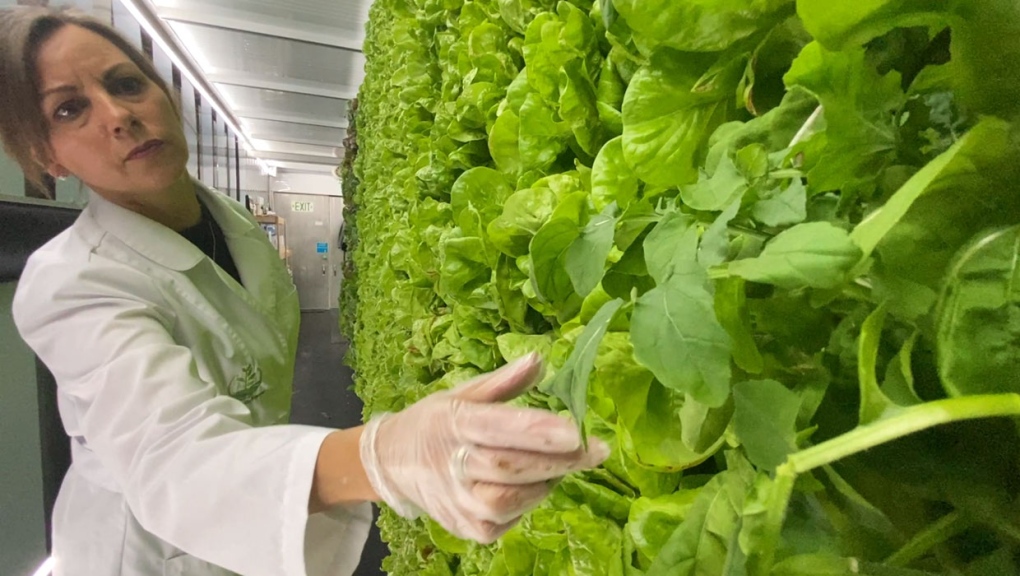High-tech, year-round sustainable farming comes to Cochrane, Alta.
A high-tech farm near Cochrane, west of Calgary, is producing thousands of heads of lettuce, and other vegetables every week, even in the darkest and coldest days of winter.
Good Life Farms Inc. operates a vertical-wall hydroponic garden inside two shipping containers.
"We are growing everything from arugula to graziano leaf lettuce, KC butterhead lettuce (and) we are actually experimenting with some root vegetables as well," said Good Life Farms founder Chad Randal.
"We've grown turnips, radishes (and) we're growing carrots as well. We're just actually planting our first tomato crop. A lot of these items, we feel that there's economic value in growing them."
Before setting his sights on hyperlocal farming, Randal spent his career in the oil patch running a successful water conservation and treatment company.
That experience piqued his interest in the sea-can gardens, as the computer-operated system occupies just under 30 square metres (320 square feet) and uses just 20 litres of water a day.
"They're a completely self-contained system. Everything has been engineered and designed to stay in a smaller footprint, eight by 40 foot footprint. We can essentially move these wherever we want, so we can set these up in parking lots.
"We can operate them on a smaller scale for smaller communities."
Randal sees it as a way for communities to set up local container farms to help overcome food scarcity issues. He says container farms can be trucked into small communities and be up and running quickly, supplying enough ongoing fresh produce for a small town.
"Our vision is to establish fresh produce for everyone or to make food available to the local community. We envision putting these facilities in all the small towns throughout Alberta, wherever opportunities present themselves."
The container farms are also partly powered by rows of solar panels on their roof, which supply just under 50 per cent of the power even through the dark days of winter.
"We still pull off the grid as well, but we are using green energy off the grid," said Randal.
"We've established ourselves as a microgeneration facility as well, but the facilities essentially take all the all the energy that the solar power, or the solar panel system can produce."

Local chef Jason MacKenzie regularly stops by Good Life's Cochrane facility to harvest fresh produce for meals he creates at a nearby retreat centre.
"It's community supportive, it's fantastic for the environment," said MacKenzie.
"I'm getting fresh produce on a daily basis if I need it that hasn't been shipped up from California."
He says it's an excellent source of fresh food, on any day of the year.
"If you went out into your garden on July day and picked some fresh lettuce, that's what you're getting (here), but I can do this in December and January, February, March – year round – and the quality is always there. The nutritional value is always there."
Randal plans to sell his fresh produce at local farmers' markets, and has recently inked a deal to sell his produce at a local retail grocery in Cochrane.
Each seacan garden costs approximately $200,000 to initially get up and running. They have an expected lifespan of more than 30 years.
Good Life Farms’ Cochrane-based facility is one of about 600 similar systems worldwide.
Randal sees his facility, in part, as a proof-of-concept for southern Alberta's climate, but says it has been so successful, he has already set his eyes on expanding and opening another seacan farm in a nearby southern Alberta community.
CTVNews.ca Top Stories

BREAKING Prime Minister Justin Trudeau's plane lands near Donald Trump's Mar-a-Lago estate
Prime Minister Justin Trudeau's plane landed in West Palm Beach, Fla., this evening, not far from where incoming U.S. president Donald Trump's transition team is based at his Mar-a-Lago estate. The Prime Minister's Office is refusing to comment on whether the two are meeting.
'Mayday! Mayday! Mayday!': Details emerge in Boeing 737 incident at Montreal airport
New details suggest that there were communication issues between the pilots of a charter flight and the control tower at Montreal's Mirabel airport when a Boeing 737 made an emergency landing on Wednesday.
Hit man offered $100,000 to kill Montreal crime reporter covering his trial
Political leaders and press freedom groups on Friday were left shell-shocked after Montreal news outlet La Presse revealed that a hit man had offered $100,000 to have one of its crime reporters assassinated.
Cucumbers sold in Ontario, other provinces recalled over possible salmonella contamination
A U.S. company is recalling cucumbers sold in Ontario and other Canadian provinces due to possible salmonella contamination.
John Herdman resigns as head coach of Toronto FC
John Herdman, embroiled in the drone-spying scandal that has dogged Canada Soccer, has resigned as coach of Toronto FC.
Musk joins Trump and family for Thanksgiving at Mar-a-Lago
Elon Musk had a seat at the family table for Thanksgiving dinner at Mar-a-Lago, joining President-elect Donald Trump, Melania Trump and their 18-year-old son.
Billboard apologizes to Taylor Swift for video snafu
Billboard put together a video of some of Swift’s achievements and used a clip from Kanye West’s music video for the song “Famous.”
Trudeau says no question Trump is serious on tariff threat
Prime Minister Justin Trudeau says incoming U.S. president Donald Trump's threats on tariffs should be taken seriously.
In a shock offensive, insurgents breach Syria's largest city for the first time since 2016
Insurgents breached Syria's largest city Friday and clashed with government forces for the first time since 2016, according to a war monitor and fighters, in a surprise attack that sent residents fleeing and added fresh uncertainty to a region reeling from multiple wars.


































